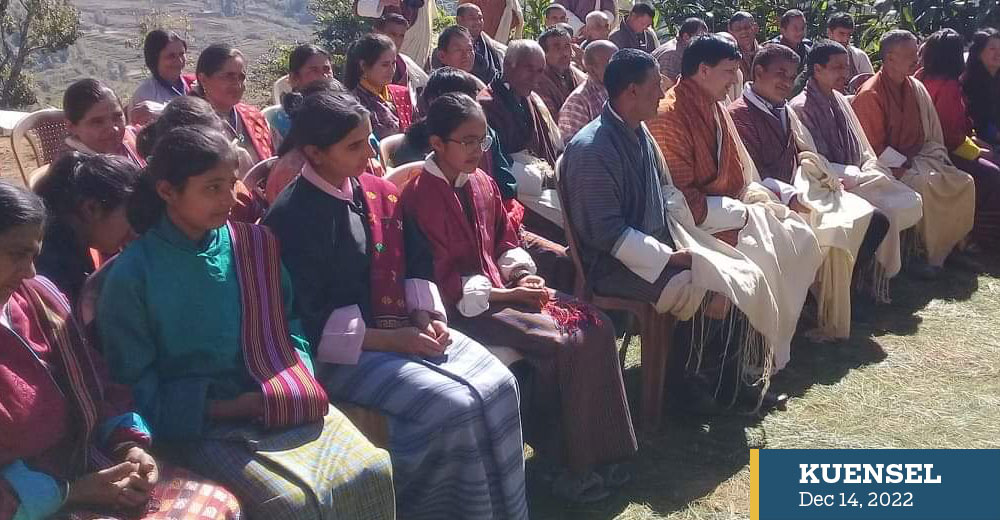…Lack of qualification, training, and empowerment holding them back
Choki Wangmo | Tsirang
Phub Zangmo Sherpa, a young mother of three, joined the Phunsum Community Forest (PCF) in 2008.
She was interested to take up executive positions at the only community forest (CF) in Kilkhorthang Gewog, Tsirang.
She did not have a formal education. But she was determined.
But it was tough; her husband was ill and she had to attend to the household chores. Her children were young then. So, her dream ended abruptly.
And there were no further calls for women to take up leadership positions at the CF.
Today, half the 237 members in the PCF are women, except for one audit position and three other executive posts that are held by men.
According to chairperson, Rinchen, the Community encourages women to participate but most are reluctant.
Rinchen has been the chairman since the CF’s establishment.
“In CF discussions and meetings, we try to engage more women participation. Maybe women think that CF works require physical strength and leave it all to men,” he said. “And, I feel that lack of educational qualification is holding them back.”
The leadership posts are social services without any incentives.
“If there are incentives, women would be willing,” says Kishore Chapagai, the CF’s accountant. As an active member, he is looking after eight different groups in the gewog, but without benefits. “Women participation in the CF is low.”
In many developing countries women are at the forefront of collection and management of forest products essential to the daily lives of their household. However, it has been widely documented that, women, for a number of cultural, socio-economic and institutional reasons, are often disadvantaged in terms of access and control over forest resources and the availability of economic opportunities.
In PCF, it was learnt that most of the female members do not know why they joined the CF. They are unaware of the benefits, rules and regulations.
A study in Bhutan reported that women’s influence in the CF management committees is limited, as they consistently hold junior committee positions.
Lack of educational qualification, training, and empowerment, women say, is holding them back.
“I have no qualification and I can’t even read or remember phone numbers,” said Phub Zangmo Sherpa.
Lachi Maya from Satsangma said: “I am not familiar with CF rules yet.”
“We were told that we can generate income from CF through commercial timber production. We planted trees but there is no proper care. I don’t know how the CF works,” said a female member of PCF.
Zangmo Sherpa, 60, from Menchuna, said that the joining CF benefitted her family with easy access to construction timbers. She is one of the oldest members of PCF.
When asked about her interest in taking up executive positions at the CF, she said that in her younger days, she had household chores and now she suffers from severe arthritis. “It never dawned on me that I could lead the CF. We led simple lives where men were actively engaged in decision making.”
It could be the conditioning and values with which are brought up in, she added. With her children away in towns, she lives alone.
Pema Sherpa, a mother of one, completed Class X. Her father, Dawa Sherpa, attends the CF meetings.
“I never attended CF meetings and I don’t know what it is all about. I think as a leader, you have to come forward and talk to people. I don’t have that confidence,” she said.
If there were incentives she might want to actively participate in the CF, she added.
Currently, except for construction timbers and small-scale non-wood forest products, there is no major benefit to members from the PCF.
Studies revealed that women are often neglected in the decision-making process within community level institutions devoted to the management of natural resources.
Addressing the gaps
Rinchen said that empowering women through training in enterprise development could be the way forward. “They lack exposure and are timid.”
This could be materialised with budget support from the local government or NGOs.
“The CF has no income. Once we earn from commercial ventures within the PCF, we might be able to pay incentives and rewards,” said the chairperson.
Research findings report that women could be involved in creating livelihood opportunities for their communities by actively participating in sustainable management of forests and biodiversity conservation. They can also lead enterprise development initiatives among themselves, skills and knowledge in product design and development.
The chief forestry officer of the Social Forestry and Extension Division, Karma Jigme Temphel, said: “To encourage more participation of women members in decision-making, he said the CF management committee must have a good representation of men and women.”
The concept of people’s participation in sustainable forest management in Bhutan started with a Royal decree in 1979.
This article is funded by JAB’s Rural Reporting Grant, supported by the Canada Fund for Local Initiatives


